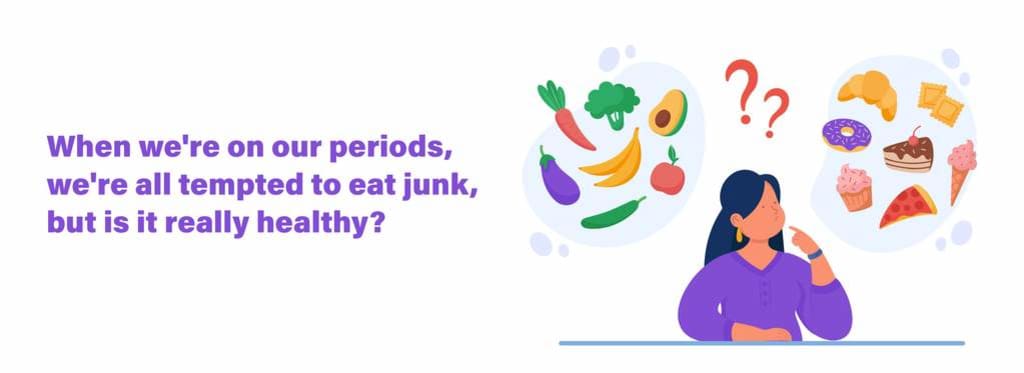
Simple steps like a nutritious diet can help to ease the pain during menstruation. Women with severe PMS (Premenstrual syndrome) have been reported to have high body temperatures, as well as chills and sweats. Some foods may lessen these symptoms, while others may make them worse. These symptoms include:
Abdominal cramps
Headaches
Diarrhea
Bloating
Fatigue
Nausea
Insomnia
Constipation
Pain in the breasts
Excessive or scanty bleeding
Yeast infections near the vagina
Mood swings
The food you can eat to relieve the pain:
If women experience any of these symptoms, adding certain foods to their diet and removing others can help them feel better during periods:
Fruits
It is advisable to consume water-rich fruits such as watermelon, cucumber, and pomegranate during your period. It will keep your body hydrated and satisfy your sugar cravings.
Veggies
Some women experience a dip in their iron levels during periods, particularly if their menstrual flow is very heavy. This can result in fatigue, body pain, nausea and dizziness. Leafy green vegetables such as spinach, coriander and red vegetables like beetroot, carrots, pumpkin, tomatoes, red peppers can boost your iron levels.
Water
It is advised to drink plenty of water during your periods. Being well hydrated can prevent you from experiencing dehydration headaches, water retention, or bloating.
Ginger
Ginger has anti-inflammatory properties, which can soothe achy muscles. Ginger may also reduce nausea. Ginger can be grated and eaten with food. Women can even drink ginger tea. However, consuming too much ginger may cause stomach pain and heartburn.
Fish
For those women who experience mood swings and depression around menstruation, omega-3 fatty acids may be helpful. They are found in fish. Fish also carries important minerals, iron and vitamin E, which are important for healthy hair and skin. In addition, Eating fish reduces period pain. For those who do not eat fish, omega-3 fatty and vitamin E supplements can be taken as per your physician's advice.
Turmeric
Some women experience constipation during menstruation. Ayurvedic medicine states that women should drink warm milk with honey and turmeric to ease period pain. Milk acts as a laxative to cure constipation and also treats insomnia. The benefits of turmeric are enormous, and it is one of the main ingredients in Indian food. The inflammatory properties of turmeric are well known in the world.
Dark chocolate
A tasty snack, dark chocolate is one of the favorites of menstruating women. Dark chocolate is not sweet and does not increase the blood sugar level. It is rich in iron and magnesium and small pieces can be eaten during periods to ease heavy flow.
Nuts, lentils, beans and flaxseed.
Most nuts contain magnesium, proteins and various vitamins. Lentils, beans and flaxseed are rich in proteins. If you are someone who does not consume meat and fish then you must eat lentils and nuts to get adequate protein-intake. Protein helps in building tissues and keeps the reproductive system strong.
White meat and Dal
White meat like chicken is another iron and protein-rich food that women can add to their diet. Eating protein is essential for women's overall health. If a woman takes a vegan or vegetarian diet, then protein can be consumed in the form of cereals and pulses. The yellow Dal made from Tur or Arhar is extremely healthy and protein-rich. It is called "pigeon-pea" and is eaten with rice or roti (flat bread). It has the status of staple diet throughout the length and breadth of India.
Yogurt and milk products
Some women have a tendency to get yeast infections during or after their periods. Thus, prebiotic-rich foods like yogurt and paneer can nourish the "good" bacteria near the vagina and may help to fight infections. Yogurt and milk are also rich in magnesium and other essential nutrients, like calcium and Vitamin D.
Tofu
For those who do not drink animal milk, soy milk and soy paneer can be helpful for them. Soybean tofu is a popular source of protein for vegans. It's rich in iron, magnesium, and calcium.
Foods to avoid:
These are the foods women want to avoid as they can worsen the symptoms and pain during periods:
Salt
Having a lot of salt in your diet leads to bloating. It is therefore advisable to avoid foods high in sodium. In addition, you should limit the amount of packaged food, junk food, and processed food you eat.
Sugar
Processed sugar and highly sweet foods can lead to an increase in body fat. Eating too much sugar can cause a spike in energy followed by a crash, worsening mood swings. Thus, watching sugar-intake can help regulate your mood.
Coffee
Caffeinated beverages can lead to bloating and water retention. Coffee might also cause digestive issues. Some women get diarrhea during periods; reducing coffee-intake could stop this from happening.
Addiction
Addiction to alcohol, smoking, and drugs can cause serious negative effects on women's overall health and menstrual health.
Red meat
Red meat contains high levels of prostaglandins, which cause severe cramps during menstruation. Thus, red meat should be avoided during periods.
Spicy foods
Many women complain that spicy foods upset their stomachs, giving them diarrhea, pain and nausea. Thus, it might be best to avoid them during periods.
Other remedies and steps for overall wellness during periods include:
Hot compresses. Hot water bottles or microwaveable hot compresses can soothe pain in your abdomen.
Oil Massaging your stomach, legs and back can reduce menstrual pain.
Exercise: Doing mild exercise or yoga helps to reduce the period cramps and also helps in relieving stress.
Sleep. Try rolling to your side and tuck in your arms and legs. This position takes pressure off your abdominal muscles and is the best sleeping position to relieve tension that can make cramping worse.
Maintain overall hygiene and keep your personal space clean and tidy.
Keep the vaginal area clean.
De-stress before bed. Try listening to soothing music or take a relaxing bath before bed.
Conclusion:
Certain foods are great to eat during periods, while others can worsen your symptoms. The foods you choose or avoid to eat will largely depend upon your specific symptoms and food sensitivity. If your periods are particularly painful to the point that you have difficulty walking or functioning, then see a gynecologist. An underlying health issue could be beginning to manifest.
Women must be mindful of what they eat during their periods, as food can have a significant impact on their overall health and wellness. It is essential to avoid foods and spices that may trigger issues and cause problems like diarrhea, vomiting, nausea and constipation. In order to maintain a healthy weight, a balanced diet is necessary.
Along with nutritional food, women should exercise daily. Usually, heavy exercise is not preferred during periods. Thus, yoga can be of great help. Women should also have exposure to ample sunlight, which is important for Vitamin D and Calcium. Right body posture is also essential while working, sleeping and eating during periods. Find more interesting topics by following us on Facebook, Instagram, LinkedIn, YouTube, Twitter, and our website.
About Saathi:
Saathi is an award winning social venture which has a patented technology to convert agri-waste into absorbent materials. Our sanitary pads are 100% biodegradable and compostable made from banana and bamboo fibers, which convert into compost in 6 months of its disposal. Saathi pads are good for the body🩸, community 🌎 and environment 🌱. We are on a mission to revolutionize the hygiene industry as a consumer products company that makes products in a sustainable and responsible way.
About the Creator
Saathi
Saathi is an award winning social venture which has a patented technology to convert agri-waste into absorbent materials. Our sanitary pads are 100% biodegradable and compostable made from banana and bamboo fibers.






Comments
There are no comments for this story
Be the first to respond and start the conversation.